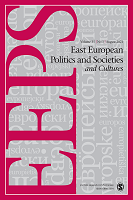Trust in the Underground: The Case from the History of “Solidarity”
Trust in the Underground: The Case from the History of “Solidarity”
Author(s): Jan OlaszekSubject(s): Civil Society, Political behavior, Politics and society, Crowd Psychology: Mass phenomena and political interactions, Post-War period (1950 - 1989)
Published by: SAGE Publications Ltd
Keywords: Poland; trust; Solidarity movement; underground activity;
Summary/Abstract: The article analyses the role of trust in the underground structures of the Polish opposition in the 1980s. The empirical material on which the analysis is based comprises historical sources concerning the history of one of the opposition groups in Warsaw, formed around an underground trade union structure (Inter-Enterprise Coordinating Committee), underground periodical (“Wola”) and a few other oppositional initiatives. The author looks for answers to the following questions: What types of trust can we find in the underground? What did it mean that one conspirator trusted another? and What was trust based on? First, the author characterizes the Solidarity movement after the imposition of martial law and shows why during this time the problem of trust was so important. Then he explains why this topic is interesting and useful not only for a historian of Solidarity but also for other researchers. He places his research in the context of historians’ works about trust, and especially about the problem of trust in communist countries. The author proposes two classifications of trust in the underground. He distinguishes trust regarding the following traits of colleagues: reliability, discretion, and integrity. The second classification concerns the basis for trust. The first type (“old”) is trust based on prior contact. The second type (“new”) is trust built during underground activity. In the conclusion, the author considers the role of trust in underground activity. The author puts forward the thesis that in opposition activities, trust was much more important than shared political views, to which historians of the Polish opposition generally attach great importance.
Journal: East European Politics and Societies
- Issue Year: 35/2021
- Issue No: 03
- Page Range: 703-727
- Page Count: 25
- Language: English
- Content File-PDF

